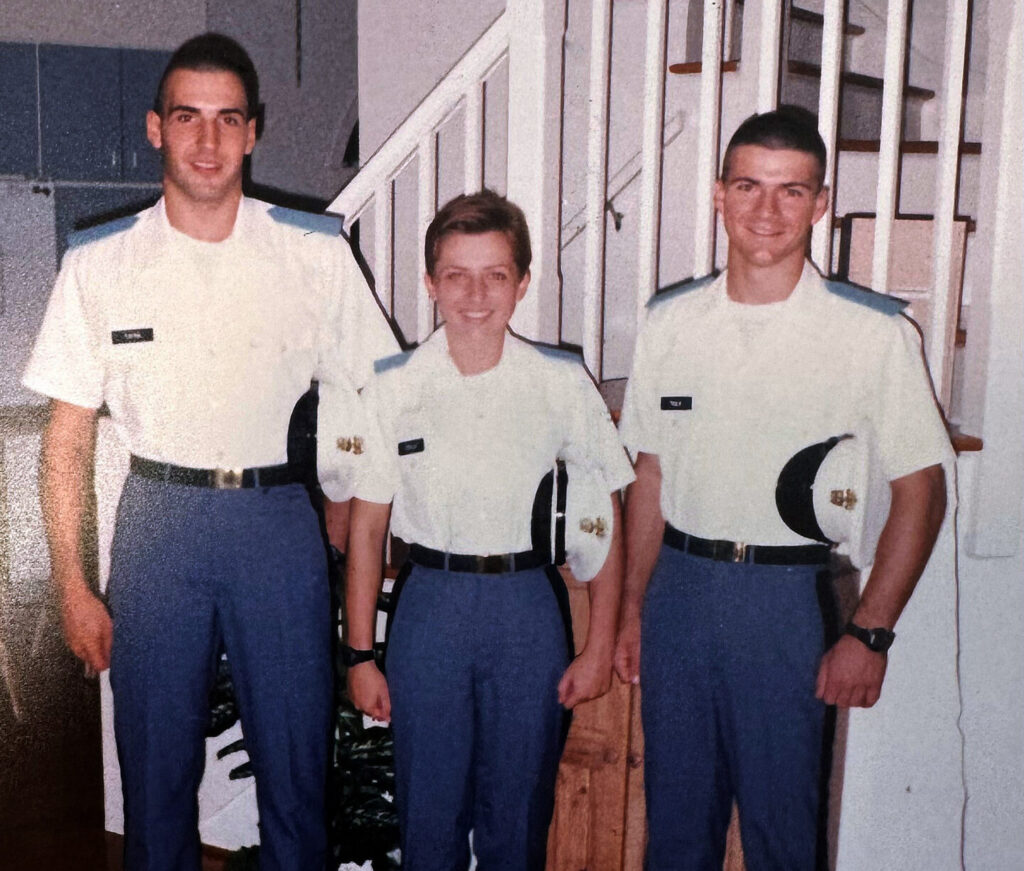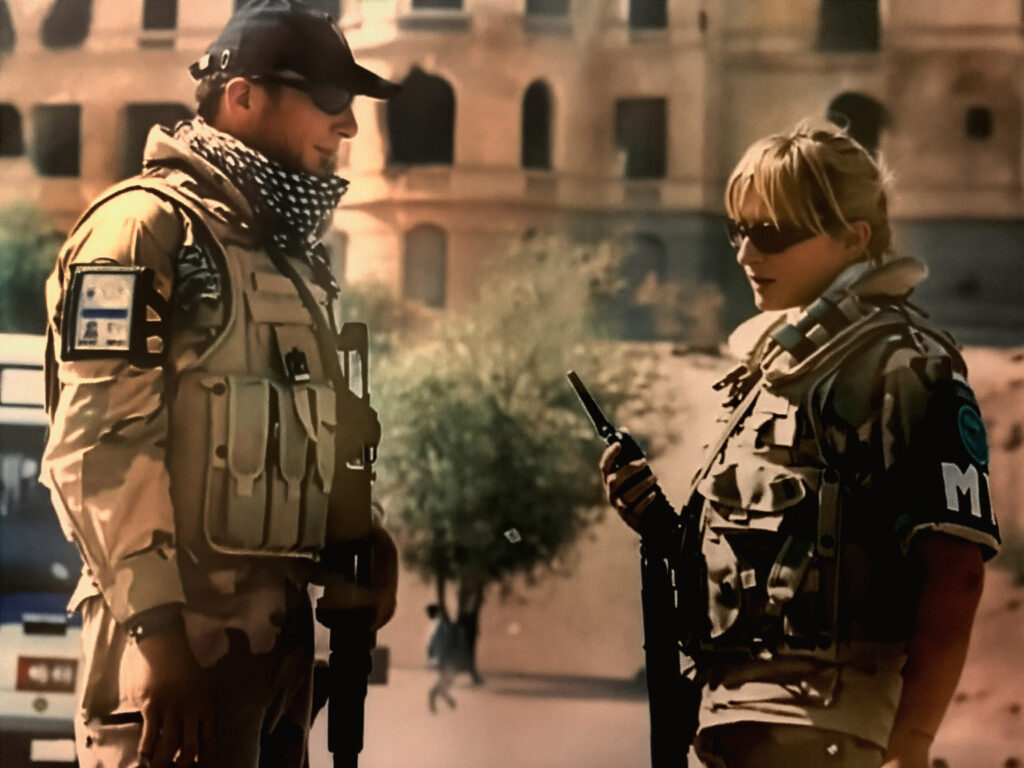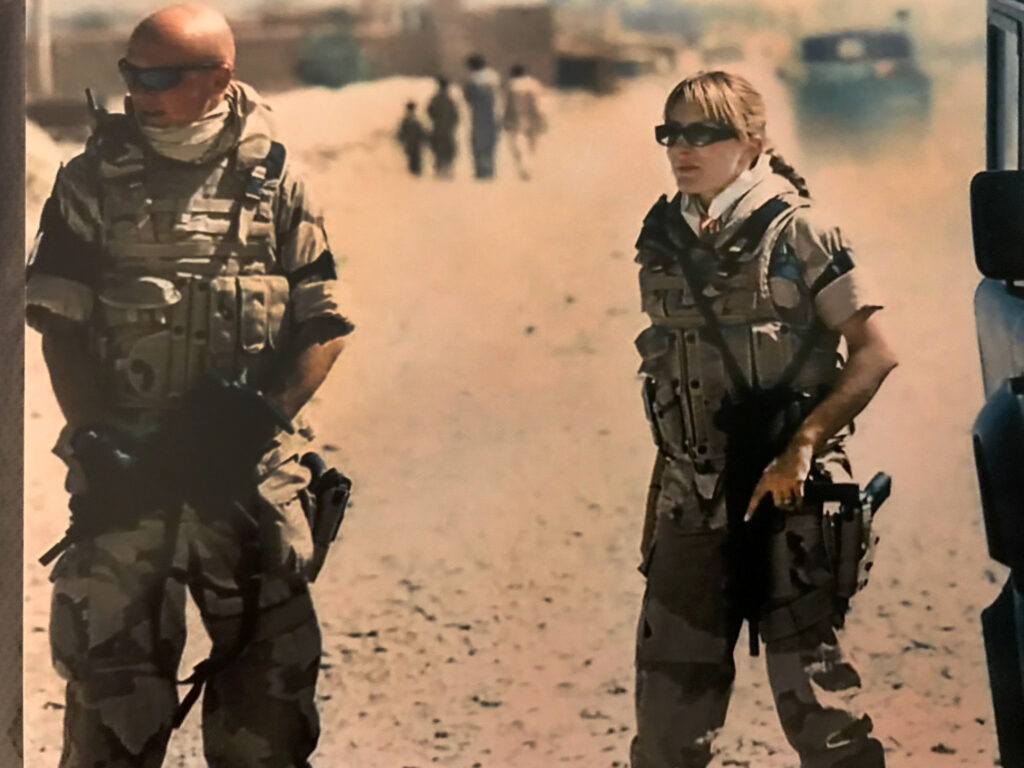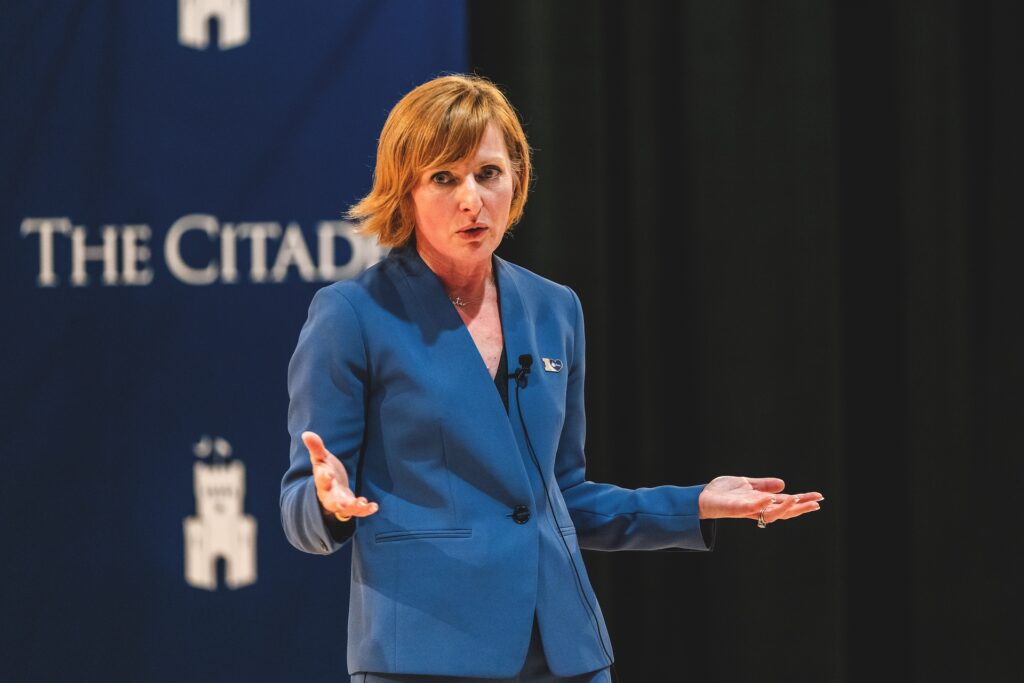Vlasta Zekulic, ’02, rose through the ranks of the South Carolina Corps of Cadets to serve as First Battalion executive officer. And she didn’t stop there. The Croatian-born graduate has kept climbing. Today, she serves as a senior official at NATO’s Supreme Allied Commander Transformation headquarters.
1998
Zagreb, Croatia
“What do you mean you’re going to the United States?” Vlasta Zekulic’s mother shrieked into the phone. “You’re going to start all over on the other side of the world? God knows what will happen to you. Why are you doing this?!”
Zekulic stood at the lone phone booth at the end of the spartan concrete-and-tile corridor in her dormitory at the Zagreb police academy. Tears streamed down her face. Her friends clustered around her, trying to comfort her. “I was crying,” she said, “and my friends were asking what was happening, but I could barely get the words out.”
“If you leave,” her mother continued, “you can forget you have a home here.”
Croatia was still recovering from the aftermath of its brutal war of independence. The country’s economy was in tatters; its infrastructure, ravaged. Zekulic’s father had died from cancer, his treatment hindered by a broken healthcare system. “It all happened so fast,” she said. Her mother was scraping by, alone, living 250 miles away in Split, an ancient city on the Adriatic Sea, in a ground- floor apartment, where she tended a garden of grapes, figs and flowers. Zekulic’s sister, a part-time model, studied biomedicine in Paris.
As a young girl, Zekulic devoured books on World War II and pictured herself as a partisan courier, darting through alleyways with secret messages. She admired bravery, patriotism and strength. While other girls dreamed of tiaras and ball gowns, Zekulic dreamed of a pressed uniform with a weapon at her side, chasing bad guys. “The spirit of law enforcement, justice and physical and mental fitness,” she said, “it was all there.”
Her family thought this was just a phase. Zekulic knew that it was her calling. When she learned of a government-sponsored program to study at an American military academy, she applied for one of a handful of openings. It was a long shot—nearly 3,000 applied, but only a few would be chosen. She had not said anything to her family … until now.
A week after the explosive conversation, Zekulic called her mother. “I understand that you’re worried,” she said, “but this is the chance of a lifetime. I’m going, whether I have a home when I come back or not.”
In the end, her mother relented, and Zekulic began preparing for what she believed would be a move to the U.S. Military Academy.

Two months later
Charleston, S.C.
The silence was palpable. She stood with her classmates in the Fourth Battalion gallery, facing the quad, one of only three freshman women in Oscar Company. They waited, tense and still.
The cadre began its death march, the platoon sergeant calling their steps: “Left. Left. Right, left, right. Left face.” The scene was cinematic. They looked magnificent—tanned and strong, white gloves sharp against black service hats pulled low. They stopped and stood at attention.
The regimental commander’s voice echoed over the loudspeaker as he addressed the Class of 2002. “This is going to be the worst four years of your life. You will never be as miserable, as tired, as hungry as you will be here, but after you survive it, you will know that whatever happens to you, you have been through worse,” Zekulic remembered him saying. “The fourth-class system is now in effect.”
With the end of his announcement, the cadre members broke apart, chaos erupting in every direction—the cadre shouting orders, freshmen dropping for pushups, others running in place, bracing at attention. The noise swallowed everything.
It was a soul-searching year—one she had planned to spend at West Point. But before she arrived, she was reassigned to The Citadel, a move she later learned was driven by a strong network of alumni determined to find qualified female candidates to help the college integrate women successfully.
When Zekulic asked about the change, she was told, “You will not be going to West Point. You’re going to The Citadel.” She remembered asking, “What is The Citadel?” They reassured her: “Same thing, same program, same credentials at the end, but it’s on the beach and there are palm trees. You’re gonna love it.”
News of an all-male senior military college in South Carolina admitting women had not made the journey to Zekulic’s side of the Atlantic. When she arrived, she found herself in unfamiliar territory— the unrelenting fourth-class system, the Southern culture and the slow pace of change. But for the young woman who beat out 3,000 other Croatian cadets for a chance to attend a U.S. military college, the challenge was what she needed.
“I had this rebellious streak in me,” said Zekulic, a computer science major with a perfect grade point ratio her first semester. “I’m fit. I’m strong. I’m smart. I deserve to be here, and there’s nothing you can do about it.”
With that realization, the petite young Croatian woman climbed the ranks. As a senior, she served as First Battalion executive officer, and when she encountered an ethical dilemma when one of her classmates needed to be disciplined, she turned to retired Army Col. Tony Lackey, assistant commandant for discipline, for guidance.
“We didn’t give you a job to be liked. We gave you a job to do what needs to be done, and whether it’s easy or hard, whether they like you for that or not, you know what needs to be done—do the right thing,” Lackey told her. “It’s a lonely place at the top. Everybody can advise. Everybody can have an opinion. But you have to lead.”
Lackey’s advice stayed with her.

2004
Kabul, Afghanistan
She stood on patrol with her unit outside Camp Warehouse, one hand resting on a NATO-issued rifle strapped across her body, the other near the pistol at her side. “It was hot and dry,” she said, “dust scraping our eyes and throats, and the smells were awful.”
Raw sewage in shallow canals oozed through narrow passages. Flies swarmed over carcasses and piles of rotting vegetables. In the distance, fields of vivid green vegetables thrived, thanks to recycled chemical toilet water.
From behind wraparound sunglasses, she scanned the roofline. In the distance, people crowded into long polling lines to cast their votes. She was 26 years old, educated by Americans, a Croatian Army officer commanding her own unit—the first woman in her country to do so. But she wasn’t content simply to follow orders; she needed to understand the reason behind them. By the time she deployed, she had already begun a master’s degree in international relations and national security. “I was studying the theory of how national security systems are built,” she said, “at the same time I was helping create one.”
Just a few years earlier, the September 11 attacks during her senior year at The Citadel had reshaped the world. She was deployed as part of the NATO- led International Security Assistance Force to help secure Afghanistan’s first presidential election.
In 2012, armed with a doctorate, Zekulic returned to Afghanistan for a third tour. The optimism was gone. “I was fundamentally disappointed,” she said. “We made a lot of tactical-level moves. NATO troops trained well and gave the Afghan forces knowledge, but it was with constant six-month rotations. It wasn’t adding up. It was a perpetual Groundhog Day. They never adopted our mindset or our values.”
In 2014, ISAF declared the mission complete and withdrew. Zekulic reluctantly followed orders but channeled her frustration into an academic article. “As a soldier, I couldn’t say what I thought,” she said. “But as a scholar, I could. I wrote about where our theory went wrong—and how we should have done better.”

2018
Brussels, Belgium
Inside NATO’s sleek, glass-walled headquarters, she clenched her fists in frustration. Twenty-eight hands had gone up for her proposal an old policy she’d revived and rebuilt into a digital system designed to untangle civilian-led projects and better support allied nations.
But one nation held out.
Breaking protocol, Zekulic approached the delegate. “We need to have a coffee,” she said.
In the cafeteria, they sat on barstools by a long window overlooking the lawn. That’s when she learned the entire dispute came down to a single word. The delegate’s country had forbidden her to approve any policy changes.
“How committed are you to the word ‘policy’?” the woman asked. Zekulic laughed, relieved the problem wasn’t the substance of her proposal and amused by the absurdity of international politics.
When the next session assembled, “policy” had been swapped for “mechanism,” and all 29 hands went up.
“The real world is messy,” she said. “It’s not nice, clean and organized. It’s not black and white. It’s complicated. It’s complex. It’s full of politics. And politics are determined by different groups, different nations, different positions, and they shift.”
Zekulic’s career with NATO began in 2014 in Norfolk, Virginia, following her last tour in Afghanistan. A Croatian army major at the time, she joined NATO’s strategic planning directorate. One of her first challenges: helping draft a strategy to counter hybrid warfare after the annexation of Crimea.
NATO leaders were so pleased with her work that they asked the Croatian government to assign her to NATO headquarters in Brussels, where she became deputy head of strategic assessment.
Brussels was also home to her mother—who had moved there to be near Zekulic’s sister and her family—the first time in more than 20 years that they all lived in the same city.
In 2017, as her tour of duty came to an end, she struggled with the idea of returning to Croatiato do more tactical-level work. She considered separating from the military and applied for a civilian job with NATO in the operations division, tracking Russian activity and planning political and strategic countermeasures.
Croatia, however, was not ready to let her go. For five years, she continued in frozen status—still in the military but working as an international civilian—before finally retiring as a lieutenant colonel.
Today, she continues her work with NATO in Norfolk, leading strategic efforts and helping shape solutions that balance the needs of 32 member nations.

2025
Charleston, S.C.
“We’re living in a world full of uncertainty and complexity,” she said as she walked across the stage in Capers Hall. The audience sat silent, fully focused on her words.
In the audience, her husband, a retired Marine, sat among cadets and faculty, listening to her journey from postwar Croatia to NATO headquarters. Her words reflected lessons learned in uniform, in classrooms and on the battlefield. She spoke about the power of planning, knowledge and leadership.
Much of campus has changed since Zekulic was a cadet. New buildings have risen. New faces fill the walkways. And the oaks around the parade ground stretch taller than before. Her return to Charleston carried her back to 1998, when a determined young Croatian woman arrived at the Military College of South Carolina and chose the road less traveled. The path was not an easy one, but she rolled up her sleeves and faced it head-on. “And that,” as Robert Frost wrote, “has made all the difference.”
Three Lessons from Vlasta Zekulic
Planning is an art
As a freshman, Zekulic began setting weekly, monthly and semester goals—a habit that stuck with her. “The ability to take everything that needs to be done and break it into manageable, doable blocks—that started here,” she said. “Then you check them off, one by one.”
Knowledge is essential
What you learn in college will become obsolete within seven years. “The world moves too fast, so it’s not the absolute terms of what you learn. It’s actually the ability to prime your brain to constantly learn and connect the dots—to let your knowledge work for you and adapt.”
Leadership means preparation and accountability
“The hardest part about leadership is dealing with the consequences of your decisions,” she said. “Your agility as a leader is your ability to live with yourself and find the right balance.”
